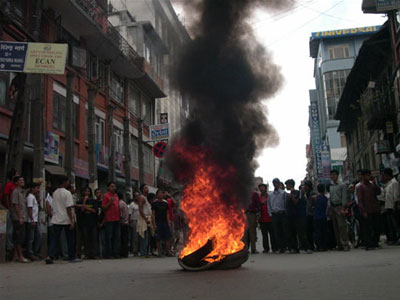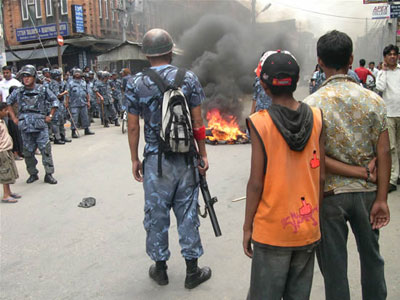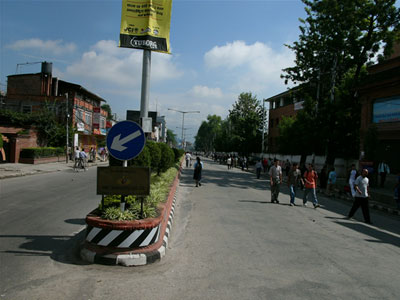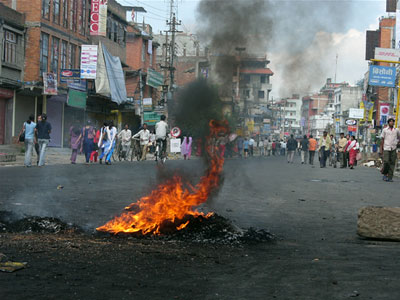After two days of street protests that brought Kathmandu and major towns to a standstill, it looks like the government may cave in and partly roll back the fuel price hike it announced on Friday night.
Speaking to reporters before returning to Kathmandu from Biratnagar on Sunday, Prime Minister Girija Prasad Koirala hinted that there would be "some adjustment" in the prices. Protests were led by student unions affiliated to the ruling parties as well as the Maoist student wing.
The price hike brought the retail prices of petrol to Rs 84.25 per litre, diesel Rs 59.08 per litre, kerosene to Rs 59.21/ltr and LPG to Rs 1,000 per cylinder.
Sunday\'s session of parliament was adjourned for an hour after outraged MPs surrounded the speaker. Even representatives belonging to Supplies Minister Hridesh Tripathi\'s Sadbhavana Party denounced the price increase. Members of the seven party alliance also distanced themselves from the hike and were all busy issuing statements and passing the buck.
The Maoists issued a strongly-worded statement Saturday signed by leaders of its eight affiliated class organizations denouncing the price increase and warning there were signs the country was ready for a "peaceful urban uprising". The Maoists said that unless the price hike was withdrawn immediately it could face "unpleasant consequences".
Supplies Minister Tripathi initially justified the price hike saying the Rs 30 million that the Nepal Oil Corporation was losing daily was unsustainable. Although NOC got its past debts to Indian refineries written off during Prime Minister Koirala\'s visit to Delhi in June, NOC\'s debts have once again soared to previous levels at Rs 3 billion.
Tripathi is now trying to work out a token rollback of the prices and is in negotiation with the Nepal Petroleum Dealer\'s Association. Successive governments in Nepal have been torn between keeping fuel prices affordable while ensuring that the prices are at par with prices across the open border in India. Till the price hike on Friday, there was up to Rs 10 differential between fuel prices in Nepal and India, and huge amounts of kerosene and diesel was being smuggled back into India creating shortages in the tarai.
The Bagmati zone representative of the Petroleum Dealer\'s Association, Achyut Khadka defended the decision saying, "This should have been done step by step and NOC needs an needs an autonomous governing board to ensure it stops facing such heavy losses."
The government could reduce the taxes to reduce the gas station prices of fuel, but it needs the revenue and can\'t let prices go down below Indian levels. To top it all, international crude oil prices are climbing and may soon reach $75 a barrel.
Meanwhile, on the streets of Kathmandu this has now become less of an economic issue and more a political one. Even political parties which should know better are trying to cash in on the fuel price hike and demand a populist reduction in prices.
WEB EXCLUSIVE | PHOTO GALLERY

Protests continued for the second day against oil price hike.
DAMBAR KRISHNA SHRESTHA

Police watch as protestors burn tires against the price hike.
DAMBAR KRISHNA SHRESTHA

The streets of Kathmandu were empty as vehicles remained off the road on Sunday.
VIBEK RAJ MAURYA

Protestors continued to burn tyre on the streets of Kathmandu on Sunday.
VIBEK RAJ MAURYA


